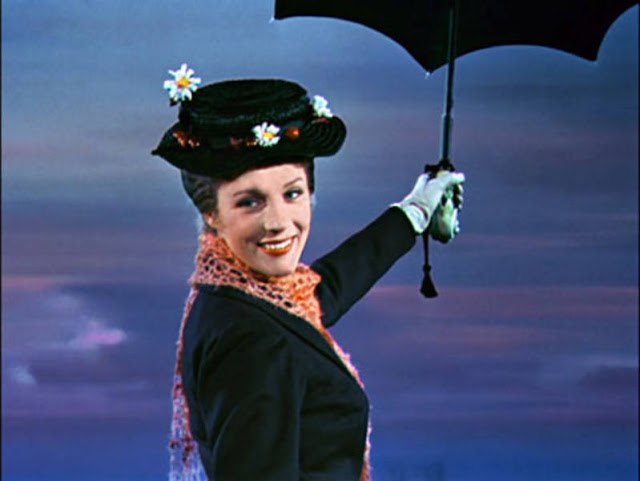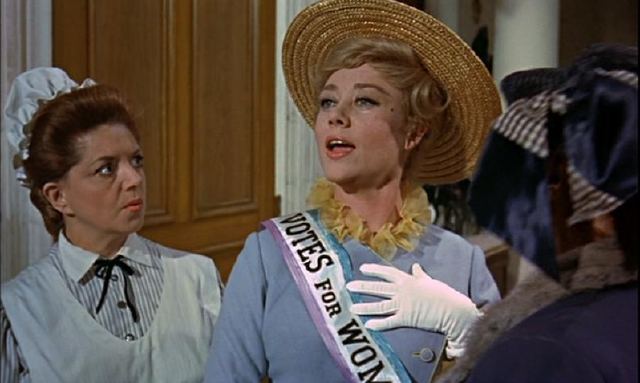 |
| Julie Andrews as Mary Poppins |
“Practically perfect in every way,” declares Mary Poppins, the quirky, assertive and indomitable nanny played with effervescence by stage and screen legend Julie Andrews. For me, that quote could pretty much sum up not only our protagonist but the film itself.
I’ve been watching Mary Poppins ever since I was about 8 years old. I was forever drawn to books and movies with strong, intelligent and outspoken female characters. And Mary Poppins is no exception.
Mary Poppins is kind yet stern, possessing a cheerful disposition. Playing games and singing songs, Mary Poppins is the nanny of Jane and Michael’s dreams. She takes them on fantastical journeys into chalk pictures, dances on the roofs of London with chimney sweeps and holds tea parties on the ceiling. Singing about spoonfuls of sugar, she teaches the children how to infuse fun into chores and the value of a positive perspective. She provides the guidance, attention and nurturing they both crave from their parents, especially their father.
Beyond a strong and charismatic female protagonist, one of the most memorable feminist scenes? Well of course I’m talking about Mrs. Winifred Banks (Glynis Johns) belting out the song “Sister Suffragette.” When I was young I didn’t realize until I heard this song — and heard that “Mrs. Pankhurst has been clapped in irons again” — that women had to fight for the right to vote.
 |
| Mrs. Winifred Banks (Glynis Johns) |
“We’re clearly soldiers in petticoats,
Dauntless crusaders for women’s votes!
Though we adore men individually,
We agree that as a group they’re rather stupid.
Cast off the shackles of yesterday!
Shoulder to shoulder into the fray!
Our daughters’ daughters will adore us
And they’ll sing in grateful chorus,
“Well done, Sister Suffragette!”
But why did the Sherman Brothers alter the homemaker into a women’s rights activist? Supposedly they needed to concoct a reason Winifred would be away from her children that would make a nanny necessary. So they made her a suffragette, making the movie accidentally feminist. Regardless, it taught many children — me included! — the struggle women endured.
Now, there are a lot of reasons to question Mary Poppins as a feminist film.
Carried on the winds by her umbrella, Mary Poppins differs from other nannies portrayed in the film by her fun whimsicality. But her beauty also sets her apart. We see Mary Poppins gazing at her reflection, powdering her nose, and bearing comely rosy cheeks. She is immediately associated as “good” due to her attractiveness.
The film showcases Winifred’s strength to advocate for women’s rights, saying that women will no longer be subservient. Yet that’s precisely what she is with her husband.
 |
| Mrs. Winifred Banks (Glynis Johns) |
George Banks (David Tomlinson) fancies himself “a king astride his noble steed,” envisioning his house a patriarchal castle and calling it “the age of men.” He haughtily berates his wife’s choice of nannies, all of who have been “unqualified disasters,” to which she promptly agrees. So George decides to take matters into his own hands and hire a proper nanny. Winifred continually tries to voice her children’s concerns, pointing out that their attempts to help or that they need kindness and understanding. And George continuously puts her down. The personal is political. Yet Winifred doesn’t seem to comprehend that.
“In six minutes of film time, Mrs. Banks is changed from a balls-out feminist — ‘No more the meek and mild subservients, we!’ — to a surrendered wife. ‘I’m sorry, dear,’ she says. ‘I’ll try to do better next time.’”
And it’s true. All her feminist badassery seems to unravel the minute her husband strolls through the door. While Winifred remains assertive in her public life, fighting for “political equality and equal rights with men,” in her personal life she speaks her mind yet obediently acquiesces to her domineering and controlling husband’s every whim.
But Winifred steadfastly continues with her suffrage activism even though she knows “the cause infuriates Mr. Banks.” But if she really let him control her, she would abandon women’s rights altogether. Winifred doesn’t cast aside her convictions merely because her husband doesn’t approve of women’s rights. She continues to fight for suffrage.
Some have criticized and admonished her as a mother for neglecting her children in order to attend meetings and protests. I call bullshit. Yes, she’s flighty. But I say her advocacy bolsters her motherhood. She continues to advocate for women’s rights, trying to make the world a more equitable place for her daughter and son.
While Winifred talks about Mary Poppins to her husband, and how she positively impacts the children’s lives, the two women never speak to one another. Really? They never talk to each other once?? Bechdel Test fail. Weird, especially considering how both Winifred, in hiring nannies and helping preserve the household trinkets during Admiral Boom’s cannon blasts, and Mary Poppins, as a caretaker to the children, occupy domestic spheres.
 |
| Julie Andrews as Mary Poppins |
With George’s job in banking and Winifred’s suffrage protests, each gains happiness outside the home. But Mary Poppins whole purpose revolves around the home. She flits from household to household healing dysfunctional families. But what about her personal life? We never really know what makes her happy. While she admirably makes her own decisions always on her own terms, Mary Poppins’ maternal role is strictly to serve others.
Even in the end, when she’s about to leave with the changing wind, her talking umbrella complains that the children never even said goodbye. While she clearly cares for Jane and Michael and her parting is bittersweet, Mary Poppins seems content. She’s finished her job and now she can go. Is that the lesson here? That we should sacrifice our own desire and always serve others? That goals other than family and home are detrimental to personal growth and happiness?
Walt Disney considered the song “
Feed the Birds,” his favorite song, the cornerstone of the movie. Mary Poppins sings about the merits of charity and the generosity of love. It’s this song that helps nudge Mr. Banks changed perspective from emotionally detached and controlling to warm and loving. And charity is certainly a noble trait. But is this subtly reifying traditional gender roles? That men are brutish while women are gentle and nurturing?
 |
| Jane Banks, Mary Poppins, Michael Banks |
In the beginning of the film, George revels in patriarchy. But Mary Poppins challenges his long-held beliefs with her frivolity and refusal to explain herself. By the end, George realizes the value and importance of spending leisurely time with his family. Sadly, it’s not suffrage or feminism that spur him to realize the folly of treating his family like servile subjects. It’s not even a woman — not Mary Poppins, not Jane his daughter or Winifred his wife — who ultimately causes George’s transformation. Bert’s discussion of toiling away at work (“grind, grind, grind at that grindstone”) while childhood and time slip away “like sand through a sieve” tips George’s metamorphosis.
You could argue that Mary Poppins’ brand of feminism, her outspoken assertiveness, truly changes all their lives. But George still couldn’t trust a woman’s words. He needed a man to reinforce her advice.
 |
| The Banks Family |
But I never saw it this way.
In the beginning of the film, Winifred gives out various sashes to Ellen the maid, Mrs. Brill the cook and Katie Nana. So clearly she possessed extras. Why assume she was automatically giving up feminist activism? Since George abhorred suffrage, I saw Winifred’s public display of her sash as a union of the personal and the political. She was bringing feminism into her family rather than merely advocating for equality politically. She was no longer hiding her identity. Finally, Winifred let her feminist flag fly. Literally.
Portraying a suffragette and an outspoken female protagonist, Mary Poppins possesses brilliant moments of feminist clarity. How many other musicals contain overtly feminist songs advocating gender equality and sisterly solidarity? While it simultaneously seems to reinforce the traditional gender roles it initially rails against, the movie forever reminds me of the need for women to speak their minds and fight for their rights, in politics and in the home.
It may not be “practically perfect” after all. But it’s pretty damn close.







But there is also the issue of class. Winifred’s activism is carried out on the backs of her servants who are less privileged than she is. And I was a little surprised to read your positive take on the inclusion of the Suffragette motif in this movie because I saw it as a parody of the cause. Still, it’s always interesting to consider a different perspective.
Rich women were pretty much the entirety of the suffragette movement, it didn’t betray anything in that regard. Usually poor women were either too busy with the economics of the house or assisting on the land.
You’re absolutely right in that I should have discussed class and its portrayal. Thank you for pointing that out.
Yeah. This reviewer doesn’t deserve to review a movie like Mary poppins. I’ve never heard so much trite crap in one piece. The movie is hesd and shoulders above anything you’ve written and probably anything you can ever write.
I wonder at how Mr. Banks is also inspired to be a better father by realizing how his detached unemotional revelry in patriarchy (and materialism) is ultimately hurting his son. It’s not an overtly feminist statement but it does come into some point of intersectionalism.
I stopped reading this near the beginning, and there is plenty I could say about this subject. But I stopped reading it soon and I’m not going to say all of what I could on this subject, for the simple reason that it is my priority to make a certain point. This point is going to surprise everyone who reads it. I know that in this point I am bringing up something which possibly nobody has ever thought of or spoken about before. But there is a first time for talking and thinking about everything. Children’s rights is not an issue which is thought about often enough. Indeed, no issue of equality nowadays is thought about as much as feminism is. But the reality is that in this film, Mary Poppins is not nice to Jane or Michael and manipulates them by trying to convince them that she has not shown them magic, when she has. If children’s rights were thought about as much as feminism is, then a lot of people would have an issue with this film. Therefore in my opinion, it can’t be considered a feminist film because it doesn’t completely support equality.